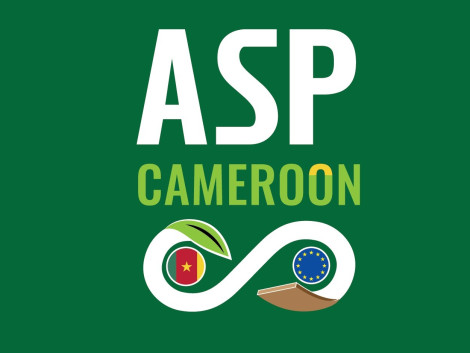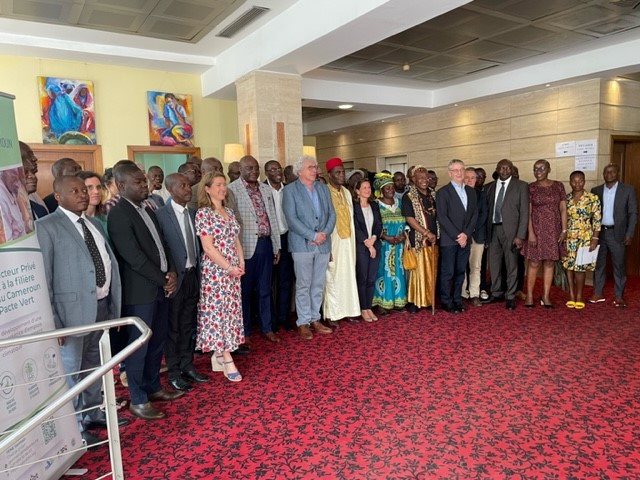

News | 24.02.2023
This Friday, February 24 was held in Yaoundé the workshop to launch the project ASP Green Pact - Cameroon. On this occasion, ATIBT publishes a press release on this new project.

The forestry-wood sector in Cameroon, towards a more sustainable production and consumption
The ASP-Green Pact project, presented on February 24, 2023 in the presence of representatives of Ministry of Forest and Wildlife (MINFOF) and the European Union (EU) in Cameroon, is financed by the EU within the framework of the Forest Governance Improvement Program (PAMFOR).
The objective of the project is to contribute to the development of a green economy, creating local jobs resilient to climate change. It aims to improve the performance of forestry companies and also to develop the domestic timber market so as to orient it towards sustainable timber purchases.
Forestry companies interested in sustainable forest management are invited to contact the project, which will support their efforts to be environmentally efficient operators. The duration of the project will be 3 years, and its conclusion is expected in early 2026.

Cameroon is recognized for the abundance and diversity of its natural heritage (2 natural sites listed as World Heritage). According to UNEP (United Nations Environmental Program), the country ranks 4th in plant diversity in Africa and 5th in animal diversity. Reputed to be a "miniature Africa", Cameroon is home to tropical rainforests (including high altitude forests in the West, very rich in endemic species, and low altitude forests, rich in mammal species), and finally transitional areas of rainforest /savannah and savannah.
The development of natural timber resources contributes significantly to Cameroon's GDP. This sector is one of the leading employers in the private sector, both upstream and downstream, through a whole network of SMEs, VSEs and craftsmen.
From the exploitation point of view, today, 6.4 million ha are Forest Management Units (FMU) dedicated to industrial exploitation, within which 3.25 million ha are legally certified and 0.34 million ha are FSC certified. Mention should also be made of communal forests and community forests.

The forestry and timber sector in Cameroon is entering a crucial stage for its future, and the challenges to be overcome are numerous, among which we can mention:
(1) the need to always better manage the resource, for all forests that have already been exploited at least once, often already twice, sometimes even three times. It is therefore necessary to encourage the reconstitution of exploited stocks, while optimizing forest exploitation in order to make it more efficient through a diversification of species or the valorization of neglected wood. Material yields in the forest and in the mills will also have to be improved through better performance of forest exploitation and diversification of manufactured products. In addition to improving performance and yields, the market for Lesser Known Timber Species (LKTS) will be addressed, as well as opportunities for payments for ecosystem services (carbon, biodiversity). Projects to support zero deforestation agroforestry projects will be studied. In addition, the inclusion of species in Annex II of the CITES should be the subject of work to better interact with this organization. These themes will be addressed under Component 1: Performance, yield and diversification.
(2) A domestic timber market that should evolve towards sustainable wood purchases. The domestic timber market is currently supplied with wood of very diverse quality. The pressure on the resource is strong and the socio-economic stakes are high. Its structuring has not yet led to sufficient and concrete results despite the will to set up a public policy of timber purchase. This policy aims at pulling the transformation sector towards a higher quality of legal and sustainable timber. With the end of log exports, the search for mechanisms to transform a greater volume of wood in Cameroon is essential. These issues will be addressed under Component 2: Domestic Timber Market.
(3) An increasingly complex, but also rapidly evolving, regulatory framework that must take into account the existing imperatives of the sector and better integrate the issues related to climate change and sustainable management. The log export ban in the CEMAC zone will be a reality in the short to medium term; companies must adapt and professional associations must strengthen themselves and interact to defend their positions. These issues will be addressed under Component 3: Advocacy, Legislation and Taxation of the project.
(4) A shrinking export market for tropical timber, particularly to the EU, but also currently to China. The environmental and social image of tropical timber must be improved on the European market, to which Cameroon is exporting more and more processed wood, with an increasing added value. The sector initiated positive communication during 2015-2016 and must now strengthen this positive communication and promote certified timber products. Companies involved in the certification process will be able to benefit from support. These topics will be addressed under component 4: Promotion, market and communication.
The project is part of the Forest Governance Improvement Program (PAMFOR) financed by the European Development Fund (EDF). MINEPAT and MINFOF are the operational bodies of PAMFOR. This project is implemented by ATIBT, JMN Consultant and CJPN International.
tag(s) :